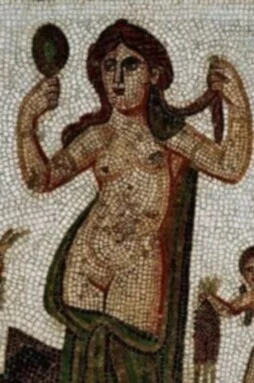Today we consider Rome, where kissing became undisputedly European.
Rome.
Roma.
So distant yet so close.
It feels like we could almost reach out and touch her…
The Romans, like us really, were complicated people and so they had lots of different words for kissing. Words like savium, basium and osculum. It is the sad fate of scholars of the classics to argue about the different meanings of these words until the cows come home but luckily I am not a scholar of the classics, so I begin my exploration of Roman culture by looking at pictures.
Quiz question : In the images below, who is enjoying their kiss the most?
The answer is number 3 : the Pompeiians. Notice the words NOLO CUM MYRTALE, inscribed above the kiss. This translates as I DON’T LIKE DOING THIS WITH MYRTLE. By implication, I DO LIKE DOING THIS WITH YOU. Ergo, the kiss in the picture is very enjoyable. Nobody else is having half so much fun.
It turns out that we do need words to understand Roman history!
(i) OSCULUM
The most common Latin word for kiss is osculum. In its original form, osculum means little mouth.
Exercise - OSCULUM
Make your own mouth little. As little as you can. Keep it tight.
And relax.
You have just immersed yourself in life as an Ancient Roman.
We understand that Romans kissed far more than ancient Greeks. The osculum is generally considered to be social, still retaining its Persian qualities. Tacitus tells us, for example, that a friendly meeting between a Parthian prince and a Roman captain would end with a kiss. He calls this the osculo finitum. The osculum was also given on formal occasions to seal contracts such as marriages and house sales.
But the word osculum is not only used in an asexual context. The philosopher Lucretius tells us that those in thrall to Venus clash with the osculum. Venus (as pictured at the top of the lesson) is the goddess of sexual love. Ergo, the osculum can be sexual too. It seems that, unlike their Athenian counterparts, Roman men kissed women on the lips without worrying too much about whether this would promote gender equality. This is because by this time, men had worked out that they were definitely naturally superior to women so such activity could be considered ‘fun’.
Put another way, they took their eye off the ball.
Thus it was that everyone in Rome was kissing each other on the lips everywhere. On the battlefields. In the banks. In the bedrooms.
Of course, these glory days couldn’t last and so it was that the mighty Empire was smitten with a cold-sore epidemic, which led to the emperor Tiberius banning kissing in public. The osculum was therefore pushed underground (which is, of course, where the Christians were) and so the Church of Rome was born. The Church contrasted the kiss of peace (osculum pace) with the kiss of shame (osculum infame) and from this point on, Europeans got to choose which osculum they preferred.
Which kiss would you choose?
OSCULUM INFAME
OSCULUM PACE
(ii) BASIUM
Another word : basium.
Catullus (84-54BCE) great poet of love, liked this word. He thought it sounded more erotic than osculum and he put it in his love poems. From here, it found its way into the modern Romance languages as - baisser, besar, beijar, baciare. I offer you a little taste of the work of Catullus : Poem V, here rendered in a brilliant and timely new translation.
Let us live and let us love,
and the judgement of foolish old men
let us value at only a cent -
Suns set and suns rise again
but when our own brief day is spent -
we will sleep through an eternal night.
So give me a thousand kisses, please, then a hundred,
Then another thousand, then a second hundred,
Then yet another thousand, hundreds more,
And when we have thousands upon thousands, we shall shake them into a chaos!
we shall lose the count!
and that no evil eye may envy us,
we shall BLIND it with infinities!
then none may know
how many many kisses we have shared…
(iii) SAVIUM
Savium is another Latin word.
It means kiss but it also carries with it a deep meaning of taste and savouring.
We might remember the Sanskrit description of drinking moisture of the lips of a slave woman …
The playwright Plautus almost exclusively uses the savium. Plautus is the very oldest Roman poet. The very oldest extant works of all Latin literature are the funny plays written by Plautus and, interestingly, he fills them with kisses. He sets the tone, so to speak.
In one of Plautus’ funny plays, we are told of a girl who gives kisses upon kisses - savia super savia. Imagine that. Sadly, the name of this girl is lost to us, but what we do know is that her mastery of the art inspired Plautus and the Romans in general to put kisses in their poetry and this is almost certainly the best thing about Latin literature which, in most other aspects, suffers in comparison with the Greeks.
Let us now take a moment to thank this great unknown master of the arts.
GRATIAS TIBI AGO, MAGISTRA.
THE UNKNOWN MASTER
With these definitions under your belt, you should be in a good position to start reading the poetry of Catullus, Plautus, Ovid, Horace, Terence and many more in the original Latin. The next part of our Roman lesson will be dedicated exclusively to the greatest of all the Latin poems, THE AENEID, so you also might want to have a quick read of that before tomorrow.
EXERCISE LESSON ELEVEN
(Osculum Funebrum)
Narcissus famously saw his own face reflected in a pool of water and became obsessed.
He tried to kiss it but he ended up falling in.
Can YOU fall into your own reflection ?
Give it a go!
Terms and Conditions: We cannot take any responsibility for the outcome of this exercise.
Mistletoe photograph : Rowan Spray
Various unknown Roman artists
Farewell of Saints Peter and Paul : Alonzo Rodriguez, 16th century
Lesbia & Her Sparrow : Brun (1860)
The Unknown Master
Narcissus : Caravaggio
Date of publication : 5.2.21












